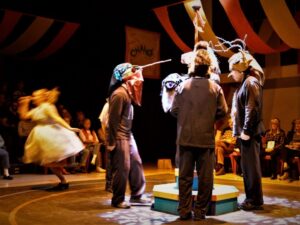William Head Theatre Society was created in 1981 by a group of incarcerated men taking a theatre course within the William Head Institution. These men decided to create a company, which at the time was called WHAT (William Head Amateur Theatre) to produce plays to show to the public. Later, the company was renamed to what it is known as today, WHoS (William Head on Stage), and it’s still going strong.
Director Kate Rubin, who has worked with WHoS for over 20 years, is directing the upcoming production Eavesdrop Café… Look WHoS Talking! Rubin says that WHoS helps incarcerated individuals gain communication and social skills that will be invaluable when trying to assimilate back into society.
“There’s a lot of communication and collaborative work done, and in that way they’re learning how to work together towards a positive outcome,” says Rubin. “They are learning how to be in the world and work in ways that are restoring who they are as people with their skill sets, so that when they do come back to the outside, they’re hopefully going to be better citizens in the sense of being proactive and doing positive things in society.”

Learning how to perform has other benefits for the incarcerated individuals involved, boosting confidence and dramatic delivery, and it can also have a positive benefit on mental health, says Rubin.
“They’re learning how to speak up in terms of projection, they’re learning how to stand and be in front of an audience and be confident,” she says. “If someone comes in and they’re super shy, there can be a huge transformation and expansion of confidence. If they’re not feeling sure about standing up in front of people and saying anything, by the end of this they’ll be feeling so much better about it and doing it with gusto and feeling really good about it.”
The program also has benefits for the audience, who usually gain a more rounded perspective on the performers, according to Rubin.
“Some people who have never been inside a prison before really have a shift in their consciousness around the people that are inside, because I think if you’re not inside and you don’t know someone in your family who’s been incarcerated, there can be certain preconceptions that label or stereotype, or put them in a particular bracket, and that gets washed away pretty quickly after they see the performance,” she says. “They’re human and they’re full of joy and laughter and hope and sadness and all the things that we have as well on the outside, but you sometimes forget that when you’re thinking of people on the inside.”
Rubin believes that those in prison—particularly in minimum security prisons like William Head—are no different than those outside of prison in terms of humanity. Prison, like life, is full of complicated grey areas, and fear and judgment toward incarcerated people are often resolved within audience members.
“There are fathers, there are wives, there are partners, mothers, brothers, all of that, there are people who have relationships on the outside, and their families will come see this show, and it makes a huge difference to their sense of esteem and their sense of success,” says Rubin. “I think that for some people, their whole mindset can be completely swept away around what they were expecting. They’re coming in with preconceived notions but it’s not black and white, good or bad, it’s all the colours in between.”
Eavesdrop Café… Look WHoS Talking!
Various times and days, Friday, October 13 until Saturday, November 4
$25, William Head Institution
whonstage.weebly.com
